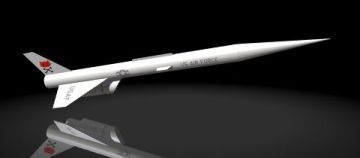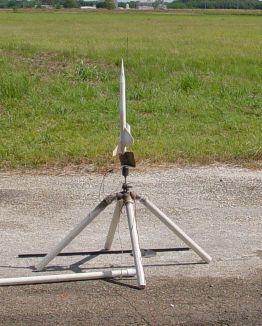| Construction Rating: | starstarstarstarstar_border |
| Flight Rating: | starstarstarstarstar_border |
| Overall Rating: | starstarstarstarstar_border |
| Manufacturer: | Shrox Industria  |
Brief:
This is an OOP (Out Of Production) kit by Shrox Industria which has not been
produced since late 2002. I purchased it directly from Shrox Industria in
Eureka, CA in September 2002 right before they ceased shipping of this and
several other fine kits. Shrox described this kit as "The Dark Art Of
Model Rocketry". The rocket resembles a futuristic ram-jet fighter plane
"inspired by high-speed target drone designs". It has six fins and a
double tube fin, described by Shrox as two wings, a tail, two canards, antenna
and a "scram jet". It uses parachute recovery.
Construction:
The kit arrived in an attractive retail type plastic bag with an excellent
looking full color header card. If I saw one of these hanging on a store shelf
I would buy it!
The kit includes:
- 1 18" BT-55 body tube
- 1 4.5" BT-55 body tube
- 1 3" BT-50 body tube
- 1 plastic BT-55 nose cone
- 1 24mm x 70mm engine mount tube
- 1 12" orange nylon thin-mil chute
- 1 Kevlar® cord
- 1 elastic shock cord
- 1 shock cord mount
- 1 clay weight
- 1 launch lug
- 1 set of rail buttons
- 1 sheet high quality 3/32" basswood stock
- 1 three color waterslide decal sheet
- 1 color parts list
- 1 fin templates sheet
- 1 4 pages color illustrated instructions on 8.5" x 11" paper
This kit was not easy to build yet the instructions were so outstanding that it made it fairly painless. While the kit did not state a skill level I would say it's a skill level 2 ½. Some previous experience would be best.
When measuring the basswood fin stock I realized that there was enough to take this kit one step further. While the kit suggested mounting the wings and tail-fin to the main airframe, I decided to slot the body tube with an X-Acto knife, measure and cut the basswood with additional full fin length TTW (through-the-wall) tabs and mount the wings and tail directly to the motor tube. This was the first time I had ever used Basswood and with it being a much harder wood than balsa, I had to use a razor saw to cut the wings and fins out. This was very time consuming. This was also the first model I had ever built with through the wall fins and while the kit did not even suggest this method, it turned out quite well. I used yellow wood glue throughout the construction. This model took several hours per day for a few days to complete.
Finishing:
This is a difficult model to paint with spray paint as it is hard to get around
and in the "scram jet" tubes. I applied a coat of white primer and a
year or so later noticed that the primer had started to bubble. So I began the
long task of sanding off all of the primer from the entire model and starting
over. It's first flight was with no paint, just remnants of the original coat
of white primer.
Construction Rating: 4 out of 5
Flight:
My Shrox Industria ScramCat's first flight was on August 21st at NASA's Johnson
Space Center in Houston, Texas with the NASA Houston Rocketry Club (NHRC). The
kit did not call for anything but a 24mm motor and I was originally planning on
using a C11-5. After watching several other flights out there that day, the
wind conditions and recovery areas seemed fine for a D12-5 so that is what I
selected to use instead. I also used a Quickburst Twiggy ignitor to make sure
that when I pushed the button, it was going up for sure.
The recovery system actually came with a piece of Kevlar® that I mounted to the motor mount. I do not recall what length elastic cord came with the kit but I added an 8 foot long piece of 1/4" sewing elastic. I showed the rocket to my RSO, explained that it was a first flight and noted the clay nose weight, kit name, and motor recommendation before being cleared for lift off.
I set the rocket on the pad with the underside of it's wings facing the east winds at 7mph. The Quickburst Twiggy supplied the Estes D12 with plenty of fire power to send the ScramCat off nice and loud on the D12-5 almost perfectly straight up to about 1000 feet. It did weathercock ever so slightly into the wind, however, it did not twist at all and the underside of the wings seemed to catch the wind and remain pointed underside into the wind as if it were wanting to fly like a plane. The flight was wonderful to watch and I was extremely pleased with the result.
Recovery:
While the orange cloth thin-mil chute that came with the kit would have been
perfectly fine, but I selected a Cycline3 10" white Frankenchute to match
the models half white primer appearance. It was difficult to stuff all of this
laundry into the airframe behind the wadding, but after 2 or 3 attempts I
managed to get all of it in there. The rocket ejected the recovery system at
apogee and the 8 foot long elastic cord and white chute reflected off the sun
and made it easier to track during descent. It landed in soft grass about 100
feet north of the pad. Upon inspection, it was flawless and ready to fly again.
Flight Rating: 4 out of 5
Summary:
This kit is certainly better than average in almost every respect, as the
components are top quality, the basswood fins/wings are very strong, the
instructions are excellent, and the recovery system with Kevlar®
is top notch. During it's pre-flight inspection another club member noted it as
being "very interesting". I think it's a shame that Shrox no longer
produces this kit as the "Shrocket" kits were some of the finest the
hobby has ever seen. I am happy to have saved all of the instructions and
templates that came with the kit so that I will be able to build another one in
the future.
Overall Rating: 4 out of 5
Sponsored Ads
 |
 |















